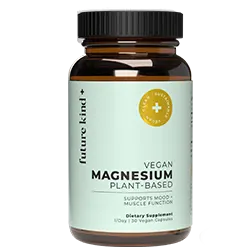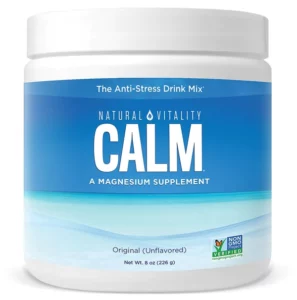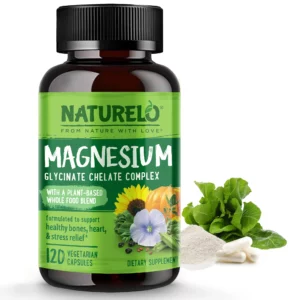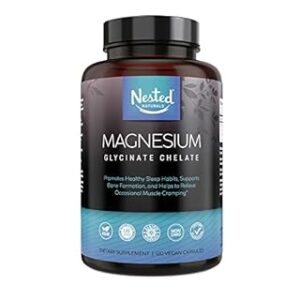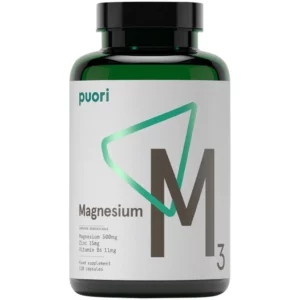Magnesium is one of the most used minerals in the body. It plays a key function in blood sugar regulation, bone health, and blood pressure levels.
Despite magnesium being readily available in a lot of foods, such as grains, legumes, and nuts, it has been observed that most Americans do not get enough from food. Steps should be taken to consume the right whole foods to maintain magnesium levels, but in the meantime, you may benefit from a supplement.
Symptoms of magnesium deficiency can include fatigue, nausea, and weakness. Below, we have listed the best vegan magnesium supplements so you can find the right one for you.
Taking a more detailed look at these Vegan Magnesium Supplements
Future Kind is an entirely vegan and cruelty-free company, founded by a family of certified nutritionists. They have created a magnesium supplement with the concern of improving sleep quality, which magnesium deficiency can affect.
All of Future Kind’s products are approved by dieticians and third-party tested for unwanted heavy metals. Their magnesium comes in the form of magnesium glycinate, which is more easily absorbable than other forms, in an easy-to-swallow capsule.
Their magnesium supplement is quite a luxury option, but its cost is justified by the quality. Future Kind also provides a subscription service where you can save 20% on your order.
Natural Vitality’s magnesium supplement comes in the form of a powder. Designed to be mixed into water or your favorite drink, Natural Vitality claims that their supplement provides a calming effect in response to stress and anxiety, a common result of a lack of magnesium.
Stress, anxiety and headaches are all possible symptoms of magnesium deficiency, so their supplement could provide those effects if deficiency is the cause of your symptoms.
However, we do appreciate the form of a powder, as some people find it hard to swallow tablets and capsules. This powder can easily be blended into a super smoothie that helps support your daily nutrient needs.
Naturelo offers a magnesium glycinate-based supplement in combination with other whole food sources. This supplement contains foods that naturally contain magnesium such as quinoa, black bean, pumpkin seed and more. This means you are supplemented by the ideal food form of magnesium, as well as the highly absorbable magnesium glycinate.
This supplement will cost you $0.30 per tablet, but that price quality is assured. Naturelo sends their supplements off to 3rd party testing. This guarantees that there are no nasty contaminants such as heavy metals in your supplements.
Nested Naturals are a great company that goes a long way in providing education about their supplements and why they are important. They outline the importance of magnesium in helping to stop muscle cramps, aid bone health and metabolism, and provide an affordable solution if your magnesium intake is insufficient.
Their products go through four stages of testing that include the quality of their ingredients and testing for dangerous contaminants. We always appreciate the extra mile taken in the quality control of products that are supposed to benefit our lives.
Costing only $0.18 per tablet, this is a great economical choice for priceless benefits.
Puori uses a combination of two Magnesium forms, Magnesium Gluconate, and Magnesium Taurinate, to ensure maximal absorption. They also include Zinc and Vitamin B6 which help magnesium carry out its role in the body, and malic acid which also aids absorption.
Puori’s supplements are certified by the clean label project, which means they have been tested for and approved to be free of heavy metal contaminants, giving you confidence in the quality of Puori’s ingredients and products.
Puori also provides a subscription for all of their products where you can save a total of 15% on each order.
What is magnesium and how much do we need?
Magnesium is a mineral that is essential for a healthy lifestyle and body. It is instrumental in healthy muscle contraction, regulation of blood pressure and blood sugar, and bone health. The recommended daily allowance (RDA) of magnesium is 400mg for men and 320mg for women.
Are vegans deficient in magnesium?
Vegans are not more likely to develop a magnesium deficiency. A vegan that follows a whole food plant-based diet will be less likely to develop a deficiency as the main food sources of magnesium are foods such as legumes, grains, and nuts. However, due to crops being grown in magnesium-deficient soils, even some of these plant foods a lacking in the vital mineral.
Some observational studies have shown that up to half of Americans are deficient in magnesium. This means that regardless of your diet and health, you may benefit from a supplement. If you are suffering from any of the symptoms of magnesium deficiency, make sure to consult a healthcare professional before taking action.
What are the best natural magnesium sources for vegans?
All the main sources of magnesium are delicious plant foods, which makes getting your magnesium in through your diet an easy and exciting process. Some of these foods include:
- Dark Chocolate – not the sugary kind, the beautiful 70% cacao solids or higher will be a great tasting hit of magnesium.
- Avocados – They can be included in any meal, whether with toast and tomatoes for breakfast or with your dinner-time tacos.
- Nuts – Nuts and nut butter make for great between-meal snacks that are loaded with loads of good stuff, including a large dose of magnesium.
- Legumes – Often the staple source of protein for a whole food, plant-based diet, you will be getting a healthy hit of magnesium with these classic favorites.
- Tofu – Another classic for plant-based protein, one serving provides 35mg of magnesium.
- Whole Grains – Grains such as oats, wheat and quinoa are all great sources of magnesium.
A balanced whole food, plant-based diet will often include some, if not all, of the foods on the list, meaning a correctly planned vegan diet can fully satisfy magnesium requirements.
Is plant-based magnesium harder to absorb?
Nearly all food-occurring sources of magnesium are plant-food, and vitamins absorbed through nutrition are always best.
Magnesium Glycinate is the most easily absorbed supplemental form of magnesium and is completely plant-based.
What are the side effects of magnesium supplements?
If you take too much magnesium, you may experience some nasty effects such as nausea, cramps, and diarrhea. Make sure to stick to the recommended dosage of your supplements, and always consult a healthcare professional when you’re considering taking a supplement.
Summary
Magnesium deficiencies can have a serious effect on your quality of life. Symptoms such as fatigue, nausea, and weakness can affect your work and personal life severely. Unfortunately, it looks like a large number of Americans are suffering from this mineral deficiency, often caused by a diet lacking plant food.
However, despite a whole food, plant-based diet being ideal for magnesium intake, vegans and followers of plant-based diets can still be at risk. A lot of soil used to grow these plant foods are magnesium deficient. Plants do not produce magnesium themselves but absorb it through the soil they are grown in. If this is the case, it may be appropriate to take a magnesium supplement to make up for the conditions which your food is grown under.
Many companies promise revitalization and calming effects, and they may well deliver on those claims if you are also suffering from magnesium deficiency. We’ve made sure to include a variety of products so that you can find one that matches your needs.
